|
Books Should Be Free Loyal Books Free Public Domain Audiobooks & eBook Downloads |
|
|
Books Should Be Free Loyal Books Free Public Domain Audiobooks & eBook Downloads |
|
Essay/Short Nonfiction |
|---|
Book type:
Sort by:
View by:
|
By: Aubertine Woodward Moore (1841-1929) | |
|---|---|
 For Every Music Lover
For Every Music Lover
A series of essays for music lovers, covering many topics. From music appreciation, to violin and symphony, music education, to piano and, in fact, the very origins of music, there is sure to be something for everyone. | |
By: Frederick Douglass (c.1818-1895) | |
|---|---|
 Collected Articles of Frederick Douglass
Collected Articles of Frederick Douglass
These two articles were reproduced as an e-book by Project Gutenberg in 2008 to supplement "...several articles by Frederick Douglass, whose larger work was presented in book form as a January, 1993 Project Gutenberg Etext to commemorate Martin Luther King Jr. Day...." The articles narrated here are "My Escape From Slavery" (1881) and "Reconstruction" (1866). | |
 Why is the Negro Lynched?
Why is the Negro Lynched?
We have felt that the most fitting tribute that we, of the Anti-Caste movement, can pay to the memory of this noble and faithful life is to issue broadcast—as far as the means entrusted to us will allow—his last great appeal for justice . A slanderous charge against Negro morality has gone forth throughout the world and has been widely credited. The white American has had his say both North and South. On behalf of the accused, Frederick Douglass claims, in the name of justice, to be heard. | |
By: Mary Antin (1881-1949) | |
|---|---|
 They Who Knock at Our Gates: A Complete Gospel of Immigration (Version 2)
They Who Knock at Our Gates: A Complete Gospel of Immigration (Version 2)
In this extended essay, Mary Antin asks us to consider three questions: First: A question of principle: Have we any right to regulate immigration? Second: A question of fact: What is the nature of our present immigration? Third: A question of interpretation: Is immigration good for us? In doing so, she asks us to step back from the usual discussion around immigration, which tends to focus on practical matters, and consider the underlying principles involved. What do we owe our fellow humans and what is our national mission as Americans? | |
By: A. A. Milne (1882-1956) | |
|---|---|
 The Sunny Side
The Sunny Side
The Sunny Side is a collection of short stories and essays by A. A. Milne. Though Milne is best known for his classic children's books, especially Winnie The Pooh, he also wrote extensively for adults, most notably in Punch, to which he was a contributor and later Assistant Editor. The Sunny Side collects his columns for Punch, which include poems, essays and short stories, from 1912 to 1920. Wry, often satirical and always amusingly written, these pieces poke fun at topics from writing plays to lying about birdwatching. They vary greatly in length so there is something for everyone. | |
 Once a Week
Once a Week
A collection of short stories by famed Winnie the Pooh author, A.A. Milne. This charmingly humorous work from Milne's earlier writing period was first published in Punch magazine. | |
 Not That It Matters
Not That It Matters
More of the witty, wry, and deliciously wicked essays and articles written by Milne. Most people know him as the creator of Winnie The Pooh, but he worked for many years as editor of Punch Magazine and these are some of his best. Not That It Matters is a collection of over 40 of these short stories and articles. Not That It Matters collects his columns for Punch, which include poems, essays and short stories, from 1912 to 1920. Most of his writing pokes fun, both gentle and not so gentle at a variety of topics... | |
By: A. W. [Editor] Latham | |
|---|---|
 Trees, Fruits and Flowers of Minnesota, 1916Embracing the Transactions of the Minnesota State Horticultural Society,Volume 44, from December 1, 1915
Trees, Fruits and Flowers of Minnesota, 1916Embracing the Transactions of the Minnesota State Horticultural Society,Volume 44, from December 1, 1915
| |
By: Abigail Mott (1766-1851) | |
|---|---|
 Narratives of Colored Americans
Narratives of Colored Americans
Abigail Mott was a Quaker and abolitionist from New York who, along with fellow Quaker M. S. Wood, has compiled a provocative collection of stories of “Colored Americans.” They range from well-known figures such as Phillis Wheatley and Sojourner Truth to the common men and women who give poignant insights of their life. Selections consist of short anecdotes, essays, stories, letters and poetry. Many have strong religious and spiritual themes. - Summary by Larry Wilson | |
By: Abraham Cowley (1618-1667) | |
|---|---|
 Cowley's Essays
Cowley's Essays
| |
By: Abraham Lincoln (1809-1865) | |
|---|---|
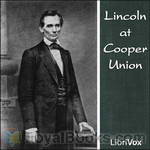 Lincoln at Cooper Union
Lincoln at Cooper Union
On 27 February 1860, Abraham Lincoln gave this address at the Cooper Union in New York City. When he gave the speech, Lincoln was considered by many to be just a country lawyer. After he gave the speech, he soon became his party’s nominee for president. | |
By: Agnes Repplier (1855-1950) | |
|---|---|
 Americans and Others
Americans and Others
A collection of sometimes biting, always clever commentaries on some of life's foibles -- as apt today as when Ms. Repplier wrote them in 1912. Though less know to modern readers, Repplier was in her prime ranked among the likes of Willa Cather. Note: Section 13 contains the word niggards. I put it in print here so that it will not be mistaken for a racial epithet when heard. (written by Mary Schneider) | |
 Essays in Idleness
Essays in Idleness
Agnes Repplier was a popular and highly regarded essayist of the late 19th and early 20th century, who was also well known on the lecture circuit. Her writings are witty, erudite, and engaging. The eight essays in this collection include an homage to her cat Aggripina and reflections on the beauty of words, as well as essays entitled "The Children's Poets," "The Praises of War," "Leisure," "Ennui," "Wit and Humor," and "Letters." - Summary by Ciufi Galeazzi | |
By: Albert Bigelow Paine (1861-1937) | |
|---|---|
 Moments With Mark Twain
Moments With Mark Twain
These selections from the works of Mark Twain are presented in chronological order. They include the memorable whitewashing of the fence in "Tom Sawyer", events preceding the Mississippi River raft journey in "Huckleberry Finn", a dark moment during the exchange of identities in “The Prince and the Pauper”, and reflections of “A Connecticut Yankee in King Arthur’s Court”. A critic wrote of another excerpt concerning a feud, "...as dramatic and powerful an episode as I know in modern literature." Also included are comments about travel abroad, Joan of Arc, a generous helping of Twain’s renowned quips, and mortality. | |
By: Albert Henry Smyth (1863-1907) | |
|---|---|
 The Philadelphia Magazines and their Contributors 1741-1850
The Philadelphia Magazines and their Contributors 1741-1850
| |
By: Alexander Bain (1818-1903) | |
|---|---|
 Practical Essays
Practical Essays
| |
By: Alexander Hamilton (1755/1757-1804) | |
|---|---|
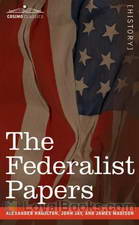 The Federalist Papers
The Federalist Papers
In order to promote the ratification of the United States Constitution in the late 1780s, Alexander Hamilton, James Madison and John Hay wrote a series of 85 articles and essays explaining their reasons to support the constitution. Most of these articles were published in The Independent Journal and The New York Packet and they later became known as “The Federalist Papers.” In reading the articles, one will encounter very interesting issues like Hamilton’s opposition to including the Bill of Rights in the Constitution and why he thinks a Union is better than a Confederation... | |
By: Alexander Pope | |
|---|---|
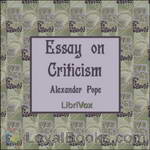 An Essay on Criticism
An Essay on Criticism
An Essay on Criticism was the first major poem written by the English writer Alexander Pope (1688-1744). However, despite the title, the poem is not as much an original analysis as it is a compilation of Pope’s various literary opinions. A reading of the poem makes it clear that he is addressing not so much the ingenuous reader as the intending writer. It is written in a type of rhyming verse called heroic couplets. | |
By: Alexander Smith (1830-1867) | |
|---|---|
 Dreamthorp A Book of Essays Written in the Country
Dreamthorp A Book of Essays Written in the Country
| |
By: Alexandre Dumas (1802-1870) | |
|---|---|
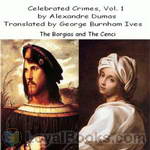 Celebrated Crimes
Celebrated Crimes
Dumas's 'Celebrated Crimes' was not written for children. The novelist has spared no language -- has minced no words -- to describe the violent scenes of a violent time.In some instances facts appear distorted out of their true perspective, and in others the author makes unwarranted charges. The careful, mature reader, for whom the books are intended, will recognize, and allow for, this fact.The first volume comprises the annals of the Borgias and the Cenci. The name of the noted and notorious Florentine family has become a synonym for intrigue and violence, and yet the Borgias have not been without stanch defenders in history... | |
By: Alfred Pretor (1840-1908) | |
|---|---|
 Ronald And I; Or Studies From Life
Ronald And I; Or Studies From Life
This is a collection of essays on English village life in the late nineteenth century. The essay “My Rector” was the focus of some controversy when published. Alfred Pretor was an English Cambridge don and classicist, author, and translator. - Summary by David Wales | |
By: Alfred Russel Wallace (1823-1913) | |
|---|---|
 Is Mars Habitable?
Is Mars Habitable?
In 1907 Wallace wrote the short book Is Mars Habitable? to criticize the claims made by Percival Lowell that there were Martian canals built by intelligent beings. Wallace did months of research, consulted various experts, and produced his own scientific analysis of the Martian climate and atmospheric conditions. Among other things Wallace pointed out that spectroscopic analysis had shown no signs of water vapor in the Martian atmosphere, that Lowell’s analysis of Mars’ climate was seriously flawed and badly overestimated the surface temperature, and that low atmospheric pressure would make liquid water, let alone a planet girding irrigation system, impossible. | |
By: Alice Christiana Thompson Meynell (1847-1922) | |
|---|---|
 Essays
Essays
| |
By: Ambrose Bierce (1842-1914?) | |
|---|---|
 The Shadow On The Dial, and Other Essays 1909
The Shadow On The Dial, and Other Essays 1909
| |
By: Andrew Lang (1844-1912) | |
|---|---|
 Lost Leaders
Lost Leaders
| |
By: Angelina Emily Grimké (1805-1879) | |
|---|---|
 Letters to Catherine E. Beecher in Reply to an Essay on Slavery and Abolitionism
Letters to Catherine E. Beecher in Reply to an Essay on Slavery and Abolitionism
This is a collection of thirteen letters from Angelina Grimké on the subjects of abolitionism and human rights in the United States. | |
By: Anonymous | |
|---|---|
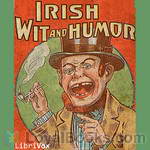 Irish Wit and Humor
Irish Wit and Humor
Excerpted anecdotes from the biographies of Swift, Curran, O'Leary and O'Connell, relating humorous snippets of politics in 18th and 19th century Ireland. For some these may be poignant in addition to being humorous and for others they may be humorous in addition to being poignant. ( | |
By: Anthony Pelcher (1897-1981) | |
|---|---|
 Astounding Stories 04, April 1930
Astounding Stories 04, April 1930
The fourth issue of Astounding Stories continues Ray Cummings serial "Brigands of the Moon", along with pulp sci-fi stories by Capt. S. P. Meek, Anthony Pelcher and other authors. | |
By: Anthony Trollope (1815-1882) | |
|---|---|
 Hunting Sketches
Hunting Sketches
| |
By: Antonio Colmenero de Ledesma (d. 17th century) | |
|---|---|
 Chocolate: or, An Indian Drinke
Chocolate: or, An Indian Drinke
The Author sings the praises of Chocolate. “By the wise and Moderate use whereof, Health is preserved, Sicknesse Diverted, and Cured, especially the Plague of the Guts; vulgarly called _The New Disease_; Fluxes, Consumptions, & Coughs of the Lungs, with sundry other desperate Diseases. By it also, Conception is Caused, the Birth Hastened and facilitated, Beauty Gain’d and continued.” | |
By: Arnold Bennett (1867-1931) | |
|---|---|
 Literary Taste: How to Form It
Literary Taste: How to Form It
Arnold Bennett describes a method for enjoying literature, and suggests the contents of a comprehensive library. Chapters 1-10 and 14 describe his method for learning to enjoy literature. Chapters 11, 12, and 13 contain detailed lists of the 337 volumes required to complete a comprehensive library of English works. This reading is from the 1913 version at Project Gutenberg, and so does not contain the revisions made by Swinnerton for the 1939 edition, which included authors of the early Twentieth Century. Swinnerton’s revisions are available from Wikipedia. | |
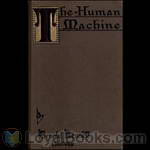 The Human Machine
The Human Machine
Bennett asks us to consider our brains as the most wonderful machine, a machine which is the only thing in this world that we can control. As he writes: "I am simply bent on calling your attention to a fact which has perhaps wholly or partially escaped you -- namely, that you are the most fascinating bit of machinery that ever was."As ever, his prose is honeyed, his thoughts inspired, and his advice as relevant today as when it was written. (Introduction by Ruth Golding) | |
By: Arthur Brisbane (1864-1936) | |
|---|---|
 Editorials from the Hearst Newspapers
Editorials from the Hearst Newspapers
| |
By: Arthur Christopher Benson (1862-1925) | |
|---|---|
 At Large
At Large
| |
 Escape, and Other Essays
Escape, and Other Essays
| |
 Joyous Gard
Joyous Gard
| |
 The Thread of Gold
The Thread of Gold
| |
By: Benjamin Disraeli (1804-1881) | |
|---|---|
 Sketches
Sketches
| |
By: Benjamin Franklin Cresson (1873-1923) | |
|---|---|
 Transactions of the American Society of Civil Engineers, vol. LXVIII, Sept. 1910 The New York Tunnel Extension of the Pennsylvania Railroad The Terminal Station - West
Transactions of the American Society of Civil Engineers, vol. LXVIII, Sept. 1910 The New York Tunnel Extension of the Pennsylvania Railroad The Terminal Station - West
| |
By: Bernard Shaw (1856-1950) | |
|---|---|
 Treatise on Parents and Children
Treatise on Parents and Children
| |
 Revolutionist's Handbook and Pocket Companion
Revolutionist's Handbook and Pocket Companion
| |
 Bernard Shaw's Preface to Androcles and the Lion
Bernard Shaw's Preface to Androcles and the Lion
| |
By: Bertram Coghill Alan Windle (1858-1929) | |
|---|---|
 Science and Morals and Other Essays
Science and Morals and Other Essays
| |
By: Bliss Perry (1860-1954) | |
|---|---|
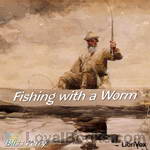 Fishing with a Worm
Fishing with a Worm
Fishing with a Worm by Bliss Perry includes the poignant and philisophical observations of a fly fisherman lured by the worm. Bliss Perry was a professor of literature at Princeton and Harvard Universities and spent time in Vermont writing and fly fishing. | |
By: Bradford Torrey (1843-1912) | |
|---|---|
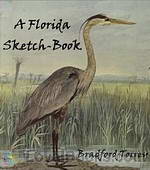 A Florida Sketch-Book
A Florida Sketch-Book
This is a series of late-19th Century essays about Florida’s flora & fauna written by a Massachusetts-based naturalist. | |
By: British Parliament | |
|---|---|
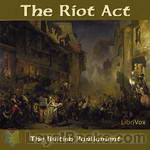 The Riot Act
The Riot Act
The Riot Act was passed by the British Parliament in 1714, the first year of the reign of George I, and came into effect in August 1715. This was a time of widespread social disturbance, as the preamble describes; the Act sought to put an end to this. A group of twelve or more people, “being unlawfully, riotously and tumultuously assembled”, would be read a proclamation; they must disperse within an hour, on pain of death. The same fate would befall anyone preventing the reading of the proclamation, or damaging buildings while on a riot... | |
By: Captain S. P. Meek (1894-1972) | |
|---|---|
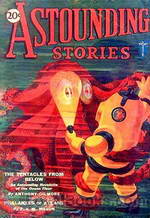 Astounding Stories 14, February 1931
Astounding Stories 14, February 1931
This issue includes "Werewolves of War" by D. W. Hall, "The Tentacles from Below" by Anthony Gilmore, "The Black Lamp" by Captain S. P. Meek, "Phalanxes of Atlans" by F. V. W. Mason, and contues with "The Pirate Planet" by Charles W. Diffin, | |
By: Carl Van Vechten (1880-1964) | |
|---|---|
 The Merry-Go-Round
The Merry-Go-Round
| |
By: Catherine Gasquoine Hartley (1866-1928) | |
|---|---|
 Women, Children, Love and Marriage
Women, Children, Love and Marriage
This book contains a number of essays about various subjects pertaining to women, children love and marriage - Summary by ashleighjane | |
By: Charles Bradlaugh (1833-1891) | |
|---|---|
 Theological Essays
Theological Essays
Charles Bradlaugh was an English political activist and atheist who founded the National Secular Society in 1866. In the 23 "Theological Essays" collected here, he discusses his views on various topics such as whether man has a soul and if there is a God; who was Jesus Christ and the Apostles. He also deals in depth with various books of the Bible, gives an overview of the history of heresy, and tries to answer the question when the Gospels were written. | |
By: Charles Dickens (1812-1870) | |
|---|---|
 The Uncommercial Traveller
The Uncommercial Traveller
The Uncommercial Traveller is a collection of literary sketches and reminiscences written by Charles Dickens. In 1859 Dickens founded a new journal called All the Year Round and the Uncommercial Traveller articles would be among his main contributions. He seems to have chosen the title and persona of the Uncommercial Traveller as a result of a speech he gave on the 22 December 1859 to the Commercial Travellers' School London in his role as honorary chairman and treasurer. The persona sits well with a writer who liked to travel, not only as a tourist, but also to research and report what he found; visiting Europe, America and giving book readings throughout Britain... | |
 Speeches: Literary and Social
Speeches: Literary and Social
| |
 All the Year Round: Contributions
All the Year Round: Contributions
| |
 Miscellaneous Papers
Miscellaneous Papers
| |
By: Charles James Lever (1806-1872) | |
|---|---|
 Cornelius O'Dowd Upon Men And Women And Other Things In General
Cornelius O'Dowd Upon Men And Women And Other Things In General
| |
By: Charles Kingsley (1819-1875) | |
|---|---|
 Sanitary and Social Lectures, etc
Sanitary and Social Lectures, etc
| |
By: Charles Mackay (1814-1889) | |
|---|---|
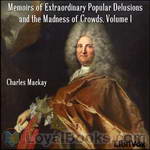 Memoirs of Extraordinary Popular Delusions and the Madness of Crowds
Memoirs of Extraordinary Popular Delusions and the Madness of Crowds
The book chronicles and vilifies its targets in three parts: “National Delusions”, “Peculiar Follies”, and “Philosophical Delusions”.The subjects of Mackay’s debunking include alchemy, beards (influence of politics and religion on), witch-hunts, crusades and duels. Present day writers on economics, such as Andrew Tobias, laud the three chapters on economic bubbles. | |
By: Charles MacLaurin (1872-1925) | |
|---|---|
 Post Mortem: Essays, Historical And Medical
Post Mortem: Essays, Historical And Medical
This 1922 collection of extensive essays comprises well written biographies of a few famous folk. The life narratives include analyses of medical and/or psychological elements in each person’s life. Biographies include Anne Boleyn, Jeanne D’Arc, The Empress Theodora, The Emperor Charles V, Don John Of Austria, Cervantes, Don Quixote , Philip II, Mr. and Mrs. Pepys, Edward Gibbon, Jean Paul Marat, Napoleon I, and Benvenuto Cellini. It concludes with an extended meditation on death. “But there... | |
By: Charles McRae | |
|---|---|
 Fathers of Biology
Fathers of Biology
An account given of the lives of five great naturalists (Hippocrates, Aristotle, Galen, Vesalius and Harvey) will not be found devoid of interest. The work of each one of them marked a definite advance in the science of Biology. There is often among students of anatomy and physiology a tendency to imagine that the facts with which they are now being made familiar have all been established by recent observation and experiment. But even the slight knowledge of the history of Biology, which may be obtained from a perusal of this little book, will show that, so far from such being the case, this branch of science is of venerable antiquity... | |
By: Charles S. (Charles Stephen) Brooks (1878-1934) | |
|---|---|
 Chimney-Pot Papers
Chimney-Pot Papers
| |
 There's Pippins and Cheese to Come
There's Pippins and Cheese to Come
| |
By: Charles W. Diffin (1884-1966) | |
|---|---|
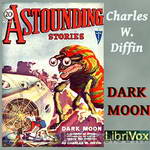 Dark Moon
Dark Moon
Mysterious, dark, out of the unknown deep comes a new satellite to lure three courageous Earthlings on to strange adventures. | |
By: Charles Willard Diffin (1884-1966) | |
|---|---|
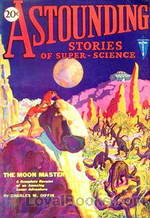 Moon Master
Moon Master
Through Infinite Deeps of Space Jerry Foster Hurtles to the Moon—Only to be Trapped by a Barbaric Race and Offered as a Living Sacrifice to Oong, their Loathsome, Hypnotic God. | |
By: Charles William Eliot (1834-1926) | |
|---|---|
 Harvard Classics Volume 28 Essays English and American
Harvard Classics Volume 28 Essays English and American
| |
By: Charlotte Perkins Gilman (1860-1935) | |
|---|---|
 The Forerunner, Volume 1 (1909-1910)
The Forerunner, Volume 1 (1909-1910)
| |
By: Christopher Morley (1890-1957) | |
|---|---|
 Mince Pie
Mince Pie
Mince Pie is a compilation of humorous sketches, poetry, and essays written by Christopher Morley. Morley sets the tone in the preface: "If one asks what excuse there can be for prolonging the existence of these trifles, my answer is that there is no excuse. But a copy on the bedside shelf may possibly pave the way to easy slumber. Only a mind "debauched by learning" (in Doctor Johnson's phrase) will scrutinize them too anxiously." | |
 Pipefuls
Pipefuls
A delightful collection of 48 essays on various topics of the human condition that caught his fancy. Witty, insightful and funny of course and on occasion thought provoking and even disturbing. From the preface "These sketches gave me pain to write; they will give the judicious patron pain to read; therefore we are quits. I think, as I look over their slattern paragraphs, of that most tragic hour—it falls about 4 p. m. in the office of an evening newspaper—when the unhappy compiler tries to round up the broodings of the day and still get home in time for supper... | |
 Shandygaff
Shandygaff
A number of most agreeable Inquirendoes upon Life & Letters, interspersed with Short Stories & Skits, the whole most Diverting to the Reader. SHANDYGAFF: a very refreshing drink, being a mixture of bitter ale or beer and ginger-beer, commonly drunk by the lower classes in England, and by strolling tinkers, low church parsons, newspaper men, journalists, and prizefighters. Said to have been invented by Henry VIII as a solace for his matrimonial difficulties. It is believed that a continual bibbing of shandygaff saps the will, the nerves, the resolution, and the finer faculties, but there are those who will abide no other tipple... | |
 Religio Journalistici
Religio Journalistici
The great Canadian journalist and humorist ruminates and reflects upon his life and calling in this 1924 little gem. - Summary by david wales | |
 Modern Essays
Modern Essays
Thirty three essays by more or less well-known authors of Britain, the United States, and Canada, each fronted by an introductory paragraph. Early twentieth or late nineteenth centuries. “I think I can offer you, in this parliament of philomaths [lover of learning], entertainment of the most genuine sort;…as brilliant and sincere work is being done to-day in the essay as in any period of our literature. Accordingly the pieces reprinted here are very diverse. There is the grand manner; there is foolery; there is straightforward literary criticism; there is pathos, politics, and the picturesque... | |
By: Clarence Darrow (1857-1938) | |
|---|---|
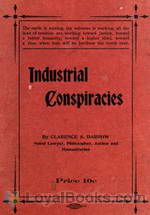 Industrial Conspiracies
Industrial Conspiracies
| |
By: Coningsby Dawson (1883-1959) | |
|---|---|
 It Might Have Happened to You
It Might Have Happened to You
This is a frank eyewitness description of the suffering, starvation in particular, that was widely experienced in Central and Eastern Europe in the aftermath of "The Great War". “It is not stating matters too strongly to say that…peace had caused at least as much misery as the four years’ fury of embattled armies.” It is a powerful political and anti-war statement with scant mention of any battle. – Lee Smalley | |
By: Dame Shirley (d.1906) | |
|---|---|
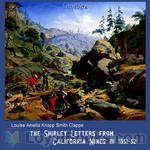 The Shirley Letters from California Mines in 1851-52
The Shirley Letters from California Mines in 1851-52
Louise Amelia Knapp Smith Clappe moved to California from Massachusetts during the Gold Rush of the mid-1800’s. During her travels, Louise was offered the opportunity to write for The Herald about her travel adventures. It was at this point that Louise chose the name “Shirley” as her pen name. Dame Shirley wrote a series of 23 letters to her sister Mary Jane (also known as Molly) in Massachusetts in 1851 and 1852. The “Shirley Letters”, as the collected whole later became known, gave true accounts of life in two gold mining camps on the Feather River in the 1850s... | |
By: Daniel Defoe (1661?-1731) | |
|---|---|
 Everybody's Business Is Nobody's Business
Everybody's Business Is Nobody's Business
| |
By: Douglas Fairbanks (1883-1939) | |
|---|---|
 Laugh and Live
Laugh and Live
Douglas Fairbanks, Sr. (May 23, 1883 – December 12, 1939) was an American actor, screenwriter, director and producer. He was best known for his swashbuckling roles in silent films such as The Thief of Baghdad, Robin Hood, and The Mark of Zorro. His book, Laugh and Live, is a book about positive virtues and advice for leading a good, healthy, and successful life. An advisory about this book is in order. Published in 1917, it was written at a time when “men went to work, women kept house, and supported their man”... | |
By: editor: Frank Munsey | |
|---|---|
 The Scrap Book Sampler
The Scrap Book Sampler
18 works -- two non-fic articles & one short fiction or poetry each -- from issues March, April, May, June, July, & August 1906 of The Scrap Book, Volume 1, edited by Frank Munsey. As he states in the editorial of the April 1906 issue (Vol 1, Iss 2) this was a sort of supplement to the editor's popular monthly, Munsey's Magazine. The Scrap Book is very like an American version of Punch with many short, often humorous articles interspersed with at least one short story, some poetry, and several longer non-fic pieces. The Scrap Book ran up to 1922. | |
By: Edmund Burke (1729-1797) | |
|---|---|
 Selections from the Speeches and Writings of Edmund Burke
Selections from the Speeches and Writings of Edmund Burke
| |
By: Edmund Gosse | |
|---|---|
 Gossip in a Library
Gossip in a Library
A collection of informal essays about books in his library. He combines commentary, translations, and humorous asides about authors and their subjects. | |
By: Edward Ziegler Davis (1878-1924) | |
|---|---|
 Translations of German Poetry in American Magazines 1741-1810
Translations of German Poetry in American Magazines 1741-1810
| |
By: Elbert Hubbard (1856-1915) | |
|---|---|
 Mintage
Mintage
Elbert Hubbard is best known as the author of the "Little Journeys To The Homes of Famous People". These 11 short stores show the side of him that celebrated caring, friendship love among humans. The first describes how 5 frightened orphan children from a foreign country were cared for on a railroad journey of a thousand miles; all by strangers without any planning and without a word of English being spoken or needed. He observed caring human men and women of all ages doing whatever was necessary to see they reached their destination in whatever comfort could be provided... | |
By: Elihu W. (Elihu Whittlesey) Baldwin (1789-1840) | |
|---|---|
 The National Preacher, Vol. 2 No. 7 Dec. 1827 Or Original Monthly Sermons from Living Ministers, Sermons XXVI. and XXVII.
The National Preacher, Vol. 2 No. 7 Dec. 1827 Or Original Monthly Sermons from Living Ministers, Sermons XXVI. and XXVII.
| |
By: Eliot Gregory (1854-1915) | |
|---|---|
 The Ways of Men
The Ways of Men
| |
 Worldly Ways and Byways
Worldly Ways and Byways
| |
By: Elisabeth Woodbridge Morris (1870-1964) | |
|---|---|
 More Jonathan Papers
More Jonathan Papers
| |
By: Emma Goldman (1869-1940) | |
|---|---|
 Anarchism and Other Essays
Anarchism and Other Essays
Chicago, May 4, 1886. In the Haymarket region of the city, a peaceful Labor Day demonstration suddenly turns into a riot. The police intervene to maintain peace, but they soon use violence to quell the mob and a bomb is thrown, resulting in death and injuries to scores of people. In the widely publicized trial that followed, eight anarchists were condemned to death or life imprisonment, convicted of conspiracy, though none of them had actually thrown the bomb. A young Russian immigrant, Emma Goldman, had arrived just the previous year in the United States... | |
By: Eustace Budgell (1686-1737) | |
|---|---|
 The De Coverley Papers From 'The Spectator'
The De Coverley Papers From 'The Spectator'
| |